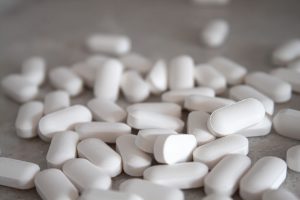Antibiotics are usually prescribed to treat diseases caused by infectious bacteria. Antibiotics typically treat bacterial infections by eliminating or preventing bacteria from reproducing and multiplying, thus leading to their eventual death. Can you drink on antibiotics? Antibiotic medications can interact with several substances.
Using antibiotics with other drugs or substances may cause unwanted side effects or health complications.
This article discusses answers to the common question, ‘Can you drink on antibiotics?’ and offers more information on the different types of antibiotics. Read on to learn how alcohol and antibiotics interact.
What is an antibiotic?
Antibiotics are medications that prevent the growth of microorganisms, mainly bacteria. The term “antibiotic” literally means “against life.”
Antibiotic medications work by either killing the bacteria or preventing them from reproducing.
If you have a bacterial infection or disease, your healthcare expert will likely put you on an antibiotic that targets explicitly infectious bacteria.
The first antibiotic, salvarsan, was introduced in the early 1900s. In 1928, penicillin was discovered, starting a golden era of finding natural antibiotics.
Penicillin was pivotal in increasing life expectancy and the safety of surgeries. Before penicillin was discovered, minor bacterial infections were typically fatal.
Antibiotics are produced in nature by soil fungi and bacteria. They come in different forms, including pills, injections, topical ointments, lotions, sprays, and drops.
Different types of antibiotics
There are different types of antibiotics, classified by how they work against infectious microorganisms and bacteria.
Several antibiotics have different mechanisms of action, so it is essential to understand how antibiotics work before using them.
Below are the different types of antibiotics:
- Penicillins: Used to treat various infections, including skin, chest, and urinary tract infections.
- Cephalosporins: Effective against more severe infections like meningitis.
- Aminoglycosides: Typically used in hospitals for severe illnesses.
- Tetracyclines: Used for acne and rosacea.
- Macrolides: Sometimes prescribed as an alternative to penicillin for lung or chest infections.
- Fluoroquinolones: Used for different types of infections.
- Broad-spectrum antibiotics: Effective against various bacteria.
- Narrow-spectrum antibiotics: Target specific kinds of bacteria.
Examples of antibiotic drugs include:
- Amoxicillin
- Azithromycin
- Erythromycin
- Cefdinir
- Ciprofloxacin
- Clindamycin
- Doxycycline
- Levofloxacin
- Nitrofurantoin
- Penicillin
- Tetracycline
- Trimethoprim-sulfamethoxazole
Can you drink on antibiotics?
Antibiotics are usually prescribed to treat infections and diseases caused by bacteria. Patients usually ask if it’s okay to drink alcohol while taking antibiotics.
Your medical professional will recommend you don’t drink alcohol if possible. Alcohol can interfere with specific antibiotics, making the medication less effective and increasing your recovery time.
Alcohol can also tamper with the effectiveness of certain antibiotics and may lead to unwanted side effects.
Antibiotics and alcohol interactions
Consuming alcohol with metronidazole can cause severe nausea, vomiting, abdominal pain, and headache. You should stay away from taking alcohol during metronidazole treatment to avoid unwanted complications.
Alcohol can heighten the possibility of side effects like stomach upset, dizziness, and headache when using Trimethoprim-sulfamethoxazole (Bactrim).
While minimal alcohol consumption is generally considered safe, it’s best to limit alcohol intake when taking Fluoroquinolones (Ciprofloxacin, Levofloxacin).
Alcohol doesn’t significantly interact with tetracyclines, but it’s still advisable not to consume alcohol excessively when using Tetracyclines (Doxycycline).
When using antibiotics, ensure to consult your doctor before drinking alcohol to avoid unwanted interactions and side effects.
Is mixing antibiotics and alcohol dangerous?
When using antibiotics, it is advisable to stay away from taking alcohol. Combining alcohol with certain antibiotic medications can increase the likelihood of severe side effects and cause the medication to be less effective.
Some side effects may include nausea, dizziness, fatigue, abdominal pain, headaches, and vomiting. Alcohol is considered a central nervous system depressant.
Your healthcare professional will advise you to avoid drinking alcohol if you can; however, minimal alcohol consumption may not cause significant reactions to antibiotics in the tetracycline class.
While taking alcohol while using antibiotics may not be inherently dangerous, there are pretty good reasons to avoid this combination.
Taking alcohol with the following antibiotics can trigger a potentially dangerous reaction:
- cefoperazone
- cefotetan
- metronidazole
- tinidazole
- ketoconazole
- isoniazid
- linezolid
- griseofulvin
Reasons to stay away from alcohol when using antibiotics
As previously highlighted, taking alcohol when using antibiotics is not advisable. The following reasons are why your doctor will advise against taking alcohol while on antibiotics.
Liver damage: Both alcohol and antibiotics are processed by the liver. Combining them can strain the liver and cause unwanted complications.
Severe side effects: Alcohol may heighten the side effects of specific antibiotics, such as dizziness, drowsiness, and upset stomach.
Individual reactions: People typically react to alcohol and antibiotics in different ways. Some people may not experience any side effects, while some may experience mild or severe adverse effects.
Reduced Effectiveness: Alcohol can hinder the effectiveness of antibiotics by affecting their absorption and metabolism.
Common antibiotic side effects
Antibiotic medications are beneficial to individuals because they work to eliminate and prevent the reproduction of infectious bacteria. Inhibiting bacteria’s reproduction process is crucial as it triggers their eventual death.
Despite its benefits to patients, antibiotics can cause some common and severe side effects. The following are some of the common side effects associated with antibiotic use:
Many antibiotics can cause gastrointestinal discomfort, including nausea, vomiting, cramps, and diarrhea.
Antibiotics, such as macrolides, cephalosporins, penicillins, and fluoroquinolones, may cause more stomach upset than others.
Consult your doctor or pharmacist about whether to take your antibiotic with food. Some antibiotics, like amoxicillin and doxycycline, are better tolerated with food, while others, like tetracycline, should be taken on an empty stomach.
If you experience severe diarrhea, abdominal pain, fever, or notice mucus or blood in your stool, contact your doctor promptly.
Photosensitivity: Taking certain antibiotics, such as tetracycline, can make your skin more light-sensitive. This effect can lead to brighter light perception in your eyes and increased susceptibility to sunburn.
Wear sunscreen with UVA and UVB protection, sunglasses, and protective clothing outdoors.
Fevers can occur as a side effect of many medications, including antibiotics. They may be due to an allergic reaction or other factors. This adverse effect is common with Beta-lactams, cephalexin, minocycline, and sulfonamides.
If you develop a fever while taking antibiotics, it will likely resolve independently.
Other less common side effects include yeast infections and allergic reactions.
Antibiotics can distort the balance of normal bacteria in your mouth or vagina, leading to yeast infections (thrush).
Although less common, some people may experience allergic reactions to antibiotics.
How does alcohol affect antibiotic treatment?
Drinking while using antibiotics may not stop your medication from treating your infections. However, alcohol can interfere with your treatment in several other ways, impacting the effectiveness of the antibiotic medication.
Alcohol can prevent you from having enough rest and eating a nutritious diet, both of which you need to recover from your disease quickly. Alcohol can alter your sleep patterns and can stop you from having a good night’s rest.
In addition, drinking can also hinder your body from absorbing essential nutrients, which can increase your blood pressure and decrease your energy levels.
Excessively taking alcohol is not generally advisable, even if you’re not on antibiotics. Alcohol abuse, excessive drinking, and chronic alcoholism can harm the body and cause unwanted reactions.
It is vital to note that alcohol is found in liquor, wines, and beers, as well as some mouthwashes and cold medications.
Before using these products, it is essential to read the instructions and ingredient lists to avoid unwanted complications.
If you’re taking antibiotics, you should always speak to your doctor before using products. In any case, it is always best to finish your antibiotic course before taking alcohol or other products.
Doctors usually prescribe antibiotics for a week or two in many cases.
When to see a doctor
Taking alcohol with antibiotics is scarcely a good idea. Both substances can trigger unwanted side effects in your body. Furthermore, taking alcohol while on antibiotics can increase your risk of experiencing the harmful effects of the medication.
Please read the label and information provided on your medication before using it. If the drug’s label explicitly says to stay away from drinking, you must follow the recommendation to prevent health complications.
Antibiotic courses are usually short and don’t extend beyond a week or two. If you have to drink, it is best to wait until you complete your dosage before having your next drink.
This may lower the risk of complications or adverse reactions from using antibiotics. In addition, staying away from alcohol will help you immensely, as your medication can properly eliminate your infection without interference or disturbance.
You must consult your doctor or healthcare expert if you’re using antibiotics. They can discuss alcohol use while on antibiotics with you so you have the knowledge and can keep yourself safe from unwanted complications.
Read also: Metronidazole Vaginal Gel: Uses, Interactions, Side Effects, More
Frequently Asked Questions
Taking alcohol while using antibiotics is not recommended, as alcohol can heighten the possibility of antibiotic side effects.
Your healthcare expert will advise you to stay away from alcohol while using antibiotics.
Alcohol use can effectively reduce how well your antibiotic prescription works against your infection.
It is always best to speak to your doctor or healthcare professional before taking alcohol if you’re on an antibiotic course.
Taking alcohol with antibiotics can trigger side effects like dizziness, nausea, fatigue, vomiting, and abdominal discomfort. Taking alcohol with some antibiotics can also trigger a disulfiram-like reaction.
A disulfiram-like reaction is a process in the body that causes symptoms similar to those that occur when patients take alcohol after taking disulfiram (Antabuse).
Disulfiram is an oral medication used to treat chronic alcoholism. This medication triggers unpleasant symptoms when alcohol is taken.
Many patients assume that taking alcohol will cancel out their antibiotics and stop them from working correctly.
According to a survey of over 300 patients by a London genitourinary clinic staff, 81% of patients believed consuming alcohol on antibiotics would cancel out the medication’s effectiveness.
In addition, 71% of patients believed mixing alcohol with antibiotics would cause unwanted side effects. In both cases, these assumptions are rarely accurate.
Healthcare professionals are worried these beliefs might make individuals skip their antibiotic medication when they inadvertently take a glass of wine or a shot of liquor.
Missing doses of antibiotics is quite problematic, as this can cause antibiotic resistance and reduce the ability of antibiotics to fight and eliminate infectious bacteria.
Most commonly prescribed antibiotics are usually not affected by alcohol consumption. However, there are apparent exceptions.
For instance, cephalosporin cefotetan slows down the breakdown of alcohol in the body.
This can lead to a rise in the body’s acetaldehyde levels, causing adverse effects like facial flushing, nausea, vomiting, breathlessness, chest pain, and headaches.
Your doctor or healthcare professional would advise you to avoid alcohol while on antibiotics. It is always best to avoid alcohol for up to 72 hours after you stop taking the antibiotic medication.
It would help if you also avoided medicines and foods containing propylene glycol during your antibiotic treatment and for 72 hours after taking antibiotics like tinidazole or metronidazole to avoid antibiotic medication interactions like a disulfiram reaction.





